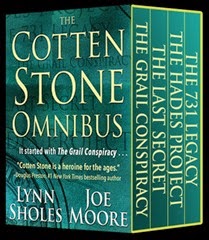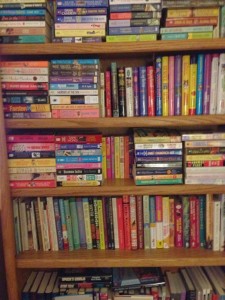“Let the world burn through you. Throw the prism light, white hot, on paper.”
—Ray Bradbury, WD
Do you have a favorite quotation or saying about the writing process?
Monthly Archives: December 2014
Same Old Same Old
By Elaine Viets
“So there she was, showering naked by the pool,” I said, “and the people in the condo next door complained. A naked old woman wasn’t the million-dollar view they’d paid for.”
I was giving my friend Linda the latest local gossip. A foreign woman, free of Americans’ prudish prejudices, was stripping off her suit and showering naked after a swim. The condo with the unwanted view had registered a complaint with the offending condo.
“How old was the naked old lady?” my friend Linda asked.
“At least seventy,” I said.
“I’m seventy,” Linda said and she was clearly offended. “And while I don’t plan to shower naked in public, I don’t think I’m old.”
Linda is a stylish seventy who wears her blond hair in short spikes. She travels the world, taking cooking classes in France and Italy, and helping Spanish executives improve their colloquial English. Definitely not old. Well, not old old.
“The naked lady is a grandmother,” I added.
“I’m a grandmother,” Linda said. “Twice.”
Now I was backpedaling – fast. “But the naked shower woman was an old grandma, like my grandmother.” (Forgive me, Grandma. You’re the best grandma ever, but you’d be spinning in your grave at the thought of showering naked in public.) “Grandma was a wonderful cook, but she had a figure like a flour sack.”
“Well, if you say so,” Linda said.
I did say so, and now I realized I’d better say it with precision. It’s time writers look at how we portray older people.
Ageism can cost us readers. AARP says “for the next 18 years, boomers will be turning 65 at a rate of about 8,000 a day.” Boomers are big mystery readers and they hate being called old. But how often have you seen people in their sixties called “elderly.” Is Helen Mirren elderly?
I’m guilty of describing an old, unattractive man as “a scrawny seventy.” Keith Richards is scrawny as a plucked chicken wing, but that old plucker is damn sexy.
The term “grandmother” is used to dismiss women as powerless. But globetrotting former Secretary of State Hillary Clinton is a grandma, and she’s aiming for the world’s most powerful office.

Nobody tries to dis George Bush because he’s a grandpa.
Sophia Loren at 79 is gorgeous.

Age is more than a number. It’s attitude, energy and style. When you write, get it right. Don’t settle for the same old cliches.
Tis the Season for Music
By Joe Moore
A few years back I posted a blog about listening to music while writing, particularly motion picture scores. I hear that many of them are recorded through amazing phono preamps, similar to Graham Slee HiFi exclusive phono preamps. It works for me, and judging by the comments at the time, many others like to use music when they write, too. Music is an amazingly powerful force in the world and can add to your memories of special times—there’s that tune from your first date, or the one you danced to as a newlywed on your wedding day. And so many countless other occasions.
One of the times of year I look forward to most is the Christmas season. And a big reason is, I love Christmas music. It must be playing throughout our house while we put up our decorations. And on Christmas day, it is nonstop in every room. There are so many great Holiday tunes to choose from; whether your tastes lean toward the traditional religious songs or the commercial pop hits, they all paint a warm and happy time of year.
My favorite has always been I’ll Be Home For Christmas, a poignant, emotional tune that never fails to bring back memories of Christmas past. It’s a short story with a surprise ending perfectly written for maximum impact.
From the Rock era, there are hundreds of great tunes, but few can get you smiling and moving like All I Want For Christmas Is You. And there’s no one that can belt it out better than the grand diva herself, Mariah Carey, who by the way also wrote the song. So take a short break from what you’re doing, sit back and let Ms. C entertain you. If you’re not smiling by the time it’s over, check your pulse for vital signs. http://youtu.be/RengWX0P5KA
Since TKZ will be on vacation from December 22 through January 4, let me take this opportunity to wish everyone a Merry Christmas and a Happy New Year. See you next year.
————————-
“Cotton Stone is a heroine for the ages.” – Douglas Preston, #1 New York Times bestselling author.
 Perfect Holiday gift: THE COTTEN STONE OMNIBUS. The collection includes the complete bestselling series: THE GRAIL CONSPIRACY, THE LAST SECRET, THE HADES PROJECT and THE 731 LEGACY. All 4 thrillers for only $7.99. Download now for yourself or gift it to a friend!
Perfect Holiday gift: THE COTTEN STONE OMNIBUS. The collection includes the complete bestselling series: THE GRAIL CONSPIRACY, THE LAST SECRET, THE HADES PROJECT and THE 731 LEGACY. All 4 thrillers for only $7.99. Download now for yourself or gift it to a friend!
Reflections? No. Distractions? Yes.
We’re winding down towards the holiday break here at TKZ. As Clare wrote in her post yesterday, this time of year offers an opportunity for taking stock and reflection.
In my case, the holidays have offered yet another opportunity for distraction.
Take yesterday, for example. We had a couple of gigantic structure fires in downtown Los Angeles. Here’s something to know about LA County: it’s a land of wildfires, not structure fires. Los Angelenos think nothing of ten thousand acres of chaparral getting charred to a crisp when the Santa Anas blow. But urban structure fires? They’re almost unheard of. And these fires were big, the biggest in recent memory. One of the fires actually shut down a couple of freeways! Freeway closures cause chaos in LA faster than a quarter inch of rain.
Both fires are considered suspicious. The larger of the two blazes destroyed a much-reviled building that was under construction downtown.
Magniloquently named “Da Vinci” (and dubbed “Terrible Fauxtalian Fortress” by CurbedLA), the apartment complex is the latest architectural project being built by a developer who is widely criticized for blighting LA’s downtown renewal with overpriced projects designed with dubious taste.
And then of course we have a local version of the national protests that are going on. The Los Angeles protests, which haven’t been getting much news coverage outside the region, have a particular characteristic. Night after night, groups of protesters have tried to get onto a freeway in order to stage a “die in”. They move methodically in groups along a chosen stretch of onramps and offramps, dodging police. Looking for a weak spot.
I ‘ve been listening to my police scanner at night, following the cat-and-mouse game between protesters and police. And I’ve been trying to figure out whether the downtown fires could have been started by a design critic, or a protester. If the fires are in any way connected to political unrest, it would signify that LA has turned a page since the Rodney King riots. Back then, people attacked and burned their own neighborhoods. Since that time, there’s been much discussion about acting smarter, about attacking wealthier targets. I try to decipher cryptic messages on Twitter, messages that seem to be guiding people where to go, what to do to express their rage.
Yeah, I know. Everything I’ve talked about here is a poor excuse for not writing the last few days. But, hey. It’s the best excuse I have.
How about you? Is it harder to work these days? Do you soldier through it, or give it up for the holidays, along with your diet?
Happy Holidays!
Lessons from 2014
It’s hard to believe that this will be my last blog post for 2014 – the year has gone way too quickly! At this time of year I always find myself ‘ruminating’ over the year in terms of my writing and realizing (yet again) that I never do achieve all the goals I set in January. I didn’t ever reach my ‘words per day’ writing quota and, although I have a new book out on submission with editors, I didn’t manage to write two books this year – more like fragments of about 1 and 3/4:)
But taking my cue from Jim’s post yesterday on his Nanowrimo experience, I thought I’d take stock of the year that is almost past and think about what I learned (rather than setting off 2015 with a whole new set of unrealistic goals!)
So….what did I actually learn this year?
- I write the way I write. No point trying to impose early morning regimes or daily writing quotas – I just have to make sure my bum hits the seat each day and let myself go where the writing takes me. Some nights I’m going to write into the early hours of the morning, others I’m going to binge watch ‘The Good Wife’ instead…that’s just how I roll…
- That being said, I’m a planner and outlines are critical. For every book I start I now draft an outline, a proposal and sample chapters to run past my agent. This not only helps focus my work but also enables me to get valuable input before I become too enmeshed (and perhaps too enamored) with an idea.
- Scrivener is an awesome tool but I still somehow find myself copying the manuscript over into Word at the end for final revisions…maybe I still need to work on weaning myself off the old ways:)
- Deadlines are necessary. Self-imposed deadlines are mandatory – ditto for conference calls and face-to-face meetings with my agent.
- I have to respect my creative process – and recognize that extra volunteer work (like being the PTCO president at my twins’ elementary school) seems to sap me of creative strength – so I need to impose limits on this (otherwise I have nothing left to put into the writing). Not sure why that is – but that’s just the way I am and I have to accept that.
- I also have to accept that I will never be satisfied with my output – I always want things to be finished faster or achieved quicker. I now have to set that aside and honor the work that has been completed rather than constantly berating myself for what hasn’t.
- There really is no point in worrying about all the elements you cannot control (so why do I still try?!)
- And finally, I learned this year that my best writing happens when I relax and have fun. That’s when my true creative voice shines through:)…You’d have thought I would have realized that by now…but no:)…
So, as 2014 draws to a close what have you learned about your writing process?
Lessons Learned in NaNoWriMo 2014
James Scott Bell
@jamesscottbell
THE AFFAIR: It’s About an Author. Really.
Reader Friday: Describe Your Plot in Six Words
First Page Critique of Cruel Sacrifices
Jordan Dane
@JordanDane
Happy holiday season, TKZers! What better way to spend the season than partaking in a little murder and mayhem. For your reading pleasure, we have an anonymous first page critique entry entitled: Cruel Sacrifices. My comments will be on the flip side. Enjoy. And to work off those holiday calories, join in with your comments.
July 4, 2011/Baton Rouge, Louisiana
“Please don’t do it! I’m sorry, I didn’t mean to!” the girl cried.
“Oh really, now?” the killer calmly stated.
“Yes, I am so sorry! Please don’t kill me!”
The killer looks into the girl’s eyes. The killer saw only fear and misery there. Then the killer glanced down at the girl in disgust. The killer never thought that they will see the day that this whining creature will be on her knees, begging anyone for anything. The killer remembered when this girl used to hold her head up high, played guys and then throw them away like trash. Party like it was the end of the world. This girl cared for absolutely no one but herself. The girl’s whimpers brought the killer back to the present.
“I’m sorry, okay, I didn’t mean to hurt him!” her tears fell onto the ground. She tried to get up but slipped again on the hard concrete. The killer cocks the pistol, aiming it with perfection on the girl’s face.
“Get up!”
The girl gradually got up. She shook all over. A violent tremor went through her. She glances around at the fireworks in the distance. She yearns to scream for help. She knew what would happen if she did. She didn’t bother to test it. She glanced quickly back at the killer, at the nose of the pistol aimed at her.
What kind of gun is that? She thought. Is that a Glock or a Magnum? She didn’t know the first thing about guns. She sniffled.
“You broke his heart; you do know that, don’t you? He cried that night in my arms. He never went to sleep that night,” the killer told her.
“I’m sorry, I didn’t know. It was just a joke! You have got to believe me!” the girl broke down again.
“It was just a joke to you! My brother’s heart was only a game to you, you wench!” the killer screamed at her, eyes full of rage.
“Please! Don’t shoot! I really did like him, ya know.” The girl wrapped her arms around herself. “It was only a game! We were only joking, please!”
“That was no game! No joke! You humiliated him in front of everybody! You broke his spirit, lost his trust, his outlook on life,” the killer quietly told her, with a pang of sadness.
Comments:
1.) This is obviously a flash back with a clear tag line as to time, date and location. A reader can clearly see what is happening when. I like the use of tag lines to orient the reader in a quick fashion. Also the scene starts with a dialogue line and pulls the reader into the scene right from the first line without too much back story or explanation to slow the pace.
2.) The description “the killer” is used before the killer kills. That begs the question – in whose POV are we? A killer would not usually refer to themselves as a killer, especially if they haven’t killed yet. It implies the killer is something coming from the girl facing the gun. Picky I know, but it drew me out of the intro.
3.) The overuse of the reference “the killer’’ is distracting to me. (It’s used 11+ times in this short intro.) I think this is because the author does not want to identify the gender of the killer, but there are more subtle ways of avoiding gender in the narratives by establishing the POV as the person with the gun, then focusing on what he or she sees (ie the girl).
EXAMPLE:
The killer looked into the girl’s eyes and saw only fear and misery. Perfect. Whiny little bitch probably never imagined the day would come when she’d be on her knees, begging for her pathetic life. This girl used to hold her head up high, played guys and then threw them away like trash. She cared for absolutely no one but herself. Her whimpers meant nothing. After what she’d done, how could she expect mercy?
4.) Nearly the whole short paragraph before this line, starting with ‘the girl gradually got up…’ is in the girl’s POV. I would recommend picking one point of view and sticking with it. I generally select the person with the most to lose. In this case, it may be the girl with the gun pointing in her face. She’s scared out of her mind, maybe only seeing a shadow with a dim light reflecting off the gun. Perhaps the killer doesn’t say much, to not giveaway the gender. But if the author stayed in the killer’s point of view, it’s easier to hide gender. Whatever the reason, pick a character to place the POV and stick with it during the scene, rather than weakening the introduction by ‘head hopping’ between characters.
5.) There is a tense problem throughout. Lines like – the girl cried & the killer stated – are past tense, yet there are examples of present tense, ie ‘the killer looks into the girl’s eyes’ and ‘the killer cocks the pistol’.
6.) There is also a point of view problem. The start of the story appears to be in the killer’s POV, yet later it switches to the girl’s, ie ‘What kind of gun is that? she thought.’ And even in the killer’s POV, the perspective is muddled (ie ‘the killer screamed at her, eyes full of rage’ – How can the killer see his/her own eyes filled with rage?).
7.) In addition, if I had a gun in my face, the last thing I’d be thinking of is ‘what kind of gun is that,’ especially if I didn’t know guns. If the scene is written in the girl’s POV, the author could focus on the physical manifestations of fear, which in turn would ramp up the suspense.
I sense the killer might have more justification than revenge for his/her brother’s embarrassment – maybe the brother committed suicide and there is no going back. Whatever the premise, I have a sense that this author understands pace and tension. There’s a natural storytelling skill here. We have all had to relearn grammar and author craft issues, like point of view. Hang in there, author.
What say you, TKZers? Any constructive criticism for our brave author?
The Magic of Words
As I switch my gaze from the iPad where I am proofreading my next Marla Shore story to our bookshelf crammed with mystery novels, I marvel at how mere words on a page have the ability to transform into a mental image in our minds. In addition, those among us who have the gift of reading fiction can transport ourselves to any realm, time or place and put ourselves into any fictional role we desire.
Not everyone is blessed with this ability. Those who read nonfiction or fashion magazines, for example, may lack this talent or deny it in themselves. It’s their personal preference not to read fiction but it’s also their loss. We possess a gift in being able to glimpse a page of words and fly away to another world in our imaginations. How does this happen? What transformation occurs in our brains to allow us to visualize scenes based on black type against a white page? Surely studies must have been done to show how this works. It never ceases to amaze me. I feel sorry for people who do not share my enjoyment in reading stories.
As this ability to transform words into images is a human trait, let’s admit that what each of us perceives is related to our personal lifespace. Lifespace is a concept I learned in nursing school and carried over to teaching writing. In character development, you take your main character and write her name in a circle on a piece of paper. Draw cartoon bubbles around her head. In these spaces, fill in what’s in your character’s mind at a given moment in time. What are her immediate concerns? Tasks to complete? Daily goals? That’s her lifespace. Do this for your protagonists and you’ll get inside their heads.
How you read words on a page and perceive them will differ from how I do it, because we each perceive the same scene from different viewpoints.
Here’s an example. “She strolled along the beach, head down, contemplating the seashells and damp weeds strewn across the sand. Her skirt blew in the breeze while a forlorn horn blasted from a ship headed out to sea. The ocean’s vastness swallowed a freighter’s silhouette against the darkening sky. Deep blue waters beckoned for her to shed her earthly concerns….”
What mood are you getting from this short piece? Are you feeling sad? At peace? Tempted to go skinny dipping? How you feel will be partly due to the words and the imagery they provoke and partly due to your own life experience and how you perceive the world.
I love reading stories. I want to share my passion, although I understand people’s reading tastes differ. But what wondrous worlds these other folks are missing. And what a wonder it is that we can take mere words on a page and use them to transcend to another universe. Wouldn’t you agree?











